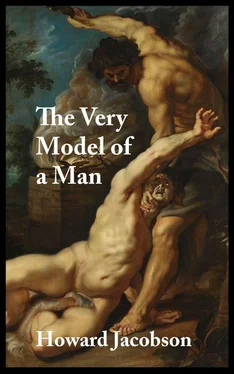And as Rebekah took the choicest garments, the goodliest raiment, of Esau her eldest son, and put them on Jacob her younger son, so does Sisobk put upon him the costly linen of Cain the elder and less loved son of Eve. He does not, though, reverse the process and put his own goodly raiment upon his unconscious guest. Why run the risk of waking him? Why waste the time? Why multiply duplicities? He is only borrowing the outward form of Cain — taking it out on loan for an hour — not usurping him. He might have got the idea from Rebekah, but he is not Jacob. He is not his brother’s thief.
Standing in Cain’s clothes, Sisobk fancies he is owner of the memory of every sin which, despite all the laundering, still clings to them. He sees forwards as a rule, not backwards. The past is a luxury to him. A feather bed. Now he understands why men are so eager to yield to it, and so reluctant ever to let it let them go. Unlike the future, which fumes and reeks, the past is placid, imperturbable, painful only as a recollection of pain. You do not return from it with blood in your eyes and foam around your mouth. Still to come, yet to be, the drama of Jacob’s jealousy must be boiled up like pottage in a prophet’s brain. Whereas Abel — already over, never to be again — comes at the first summons, like a remembrance of youth.
As long as you are mantled in his brother’s garments, odoriferous with wrongdoing, the lovely doted-upon boy glides sociably before you, starts at you adorably from the fields, whiter than his woolly sheep, or presents himself, shiftless, shameless, in that scalloped rock wherein his mother worshipped him clean.
Sisobk holds him there, indifferent to the shapeliness and becoming pallor of his limbs, intrigued only by the configuration of the boy’s own desires, the thing he envied, not the thing he was envied for. Envious? Abel? But of course. Is this not the lesson of Jacob — that the good brother must always covet the accumulations of the bad: the red hair, the mouthful of milk teeth, the daughters of Canaan, the carcasses of meat, the wherewithal to please a father, the wherewithal, on such a scale, to displease a mother? The last especially. Who would settle for being merely the apple of his mother’s eye, when he could be the arrow in her side, the thorn in her flesh, the pestilence in her blood?
Envious? Abel?
The one-time prophet, turned historian, shudders and pulls his adopted gown around him. He likes the direction of his thoughts. Very soon, very soon now, he believes he will have achieved that moral reversal without which there can be no comprehending the affairs of men. Yes, it is good for him, borrowing the skin of a distinguished and proven fratricide. He can feel it charging him with light. Flooding him with goodness. He is ready, like a descended angel, to try his newfound footing on the streets.
He closes the door quietly behind him and goes down into the city. He does not know what he is going to find, or how it is going to find him, but he is serenely, superbly, angelically confident that by the time he returns he will have grasped the sense in which Abel can be said to have killed Cain.
He wakes, the victim in question, without his clothes, in a cold room none of his senses recognises. Foul tatters have been thrown around him. An appalling stench, glutted with the morbid discharges of mind no less than body, comes off them and off himself. Wherever he is, he has been here long enough to be impregnate with the place.
He waits for his eyes to make something of the darkness, then tries to find his way around the room. He reaches for the security of walls, but recoils from them at the first touch. They are wet with slime, slippery like the clay sleeves of a potter or the insides of his pot. He feels about him for his clothing, but nothing that sticks to his fingers is familiar to him.
He decides that he has been stripped and robbed and dumped here. In which case I suppose I ought to count myself fortunate that they have left me with my life, he catches himself thinking, before he remembers that fortune doesn’t enter into it. Hath not the Lord set a mark upon him, lest any finding him should…
He shakes his head fiercely, as a parent might shake a bad dream out of a screaming child, in order to dispel all recollection of that hateful hour when the Lord marked him with the shame of fatalism, branded him where everyone would see it, with an unresisting tragicalness which rendered any idea of doing violence to him otiose, since you knew you could take from him without it, and since you knew you could damage him the more seriously, anyway, by leaving him to damage himself. Only the pertinacious are worth murdering, the Lord calculated — proceeding from the knowledge of the murderer in Himself — and as a consequence lined Cain’s face with restiveness but not resolution. ‘They have only to look at me,’ Cain feared, ‘to see that I do not expect to prevail.’ And because he feared it, it was so.
God’s final rebuff to him: Thou shalt be unkillable.
No matter where the room, no matter what the hour, he has never mastered waking. When Zilpah woke with him, starting into consciousness wonderfully, the very second he did — ‘See,’ she would say, ‘how finely we are attuned, how identically we are twinned’ — she took the hopelessness of his expression, the abstraction in his eyes, to be the consequence of his having raised his hand against his brother.
‘It will eventually pass,’ she promised him, pressing her cold lips to his brow, or into the hollow sockets of his seeing, as though she would taste their weariness, swallow it for him, swallow it from him. ‘The day will eventually come when you will not remember.’
But in this, as in everything else, she was mistaken. His brother has nothing to do with the apparently contradictory sensations of universal worthlessness and personal insufficiency to which he invariably wakes. It was the same even when his brother lay sleeping unbruised beside him. All that has changed is that he is now without anybody close to him to punish for how he feels.
This has been the most lasting effect of his crime against his brother: he has once and for all denied himself the other side of his great argument with life. He has risen against his own yearning to quarrel, to be at variance, to enjoy and suffer disjunction, no less than he has risen against his own blood.
As with all those who take extreme measures to silence their rivals, who are literal enough to insist that their view must alone prevail, his punishment is identical with his crime — single-mindedness.
Single.
Mindedness.
But he does not wake to an immediate apprehension of this. He has to crawl towards it every morning.
He would like something to eat and drink. No man experiences futility in the act of devouring food. But he is not prepared to search for victuals in this room. He ties a rag around his loins and feels his way to the door. Like a dog scenting love or liver, he lifts his head and twitches his nostrils. And then it comes back to him, where he is and how he got here. The smell that does it is not the smell of damp timber and streaming walls, but the smell of visionaries and their unventilated hallucinations. Spectres always leave an odour behind, and the stairwell is choked with the charred oniony sweetness of their passing.
He is reminded of a whimsical expression of starvation commonly used by the beggars of Babel — ‘I am so famished I could eat a ghost.’ Which, for all that he detests whimsy, makes him hungrier.
He descends the stairs, disgusted by what he imagines the timbers to be oozing beneath his unsandalled feet. From a doorway on the half-landing a finger beckons him. ‘Traveller,’ a voice whispers, ‘dost thou know how many sparks from the great One Spark lie trapped in every ear of corn? Canst thou count the brilliances imprisoned in a loaf of bread?’
Читать дальше











